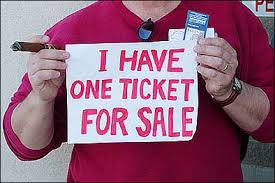Imagine that your favorite singer has a concert tomorrow and all the tickets are sold out!! You are a great fan and you cannot miss it. So what will you do now? You will probably search for the ticket in the secondary market and find a prospective seller who is interested in selling his own ticket to you. Even if the price is higher than the actual price, you will buy it anyway because you don’t want to miss the show. Here, what the seller is doing is known as ticket scalping or resale.
Ticket scalping refers to the resale of tickets of an event at an exorbitant price above the actual value. It is usually prevalent at concerts, sports events and other entertainment events. The main reason that leads to ticket resale is the excess demand for attending the event and its limited supply. Generally prices set for attending such events are kept low in order to attract public. But failing to estimate the number of buyers, the event holders end up having excess demand. Because of the shortage of supply, the willingness to pay for the limited tickets increases. This enables the scalpers to earn huge profits.
Ticket scalping is considered unethical and illegal (in some countries) due to violation of market rules and regulations. But from an economists’ perspective it is simply a function of free market. Free market is the one in which the prices and quantities of goods and services are determined by the interaction of market forces i.e. the Demand and Supply. There is no intervention by any authority. It is the “invisible hand” that drives the economy. In free trade the equilibrium or the outcome is an efficient allocation of resources of the economy.
The Price and Quantity determined by market forces are optimal. The markets clear when the demand is equal to the supply. But when prices are set below the equilibrium price, it leads to excess demand which in turn increases the possibility of scalping by increasing willingness to pay. In a free market the goods and services are allocated to the buyer who values them the most. This is in the same context that the people who really want to attend the concert are ready to pay a lot implying that they value it a lot. Therefore, in a ticket scalping transaction, the sellers are better off by gaining large profits and the buyers are better off as their wants are satisfied. It leads to a mutually advantageous outcome. It’s the free market at work! That is why many economists oppose anti- scalping laws and defend it by the argument of free trade.
According to the Harvard economist Greg Mankiw:
“Consenting adults should be able to make economic trades when they think it is to their mutual advantage”.
Before many of you start thinking of scalping tickets for the next event, it should be made clear that it is not profitable every time. If the demand is less than the supply, then scalpers may end up selling tickets at a loss.
Again it’s the free market at work!
Click here for government certifications





17 Comments. Leave new
Actually isn’t that illegal..??
Yes it is illegal. But such a trade is efficient from an economist’s view because it is a result of free trade.
unique article…!! enjoyed reading it
thanks!
Good work
Interesting to read..
Thanks!
Atta girl
Thank you kritika 🙂
Black marketing much? Interesting concept.
yes divya it is a sort of black marketing..
Eagerly waiting for ur next article!!! Knowledgeable and appealing writing
Good effort
Good work..nice concept
Very well written.
very well written !
good work 😀
It’s not legal and it’s not fair to people like you and me who’d really want that ticket. Nevertheless, it’s profitable for the other person who is selling it. He is making commission.
Interesting!